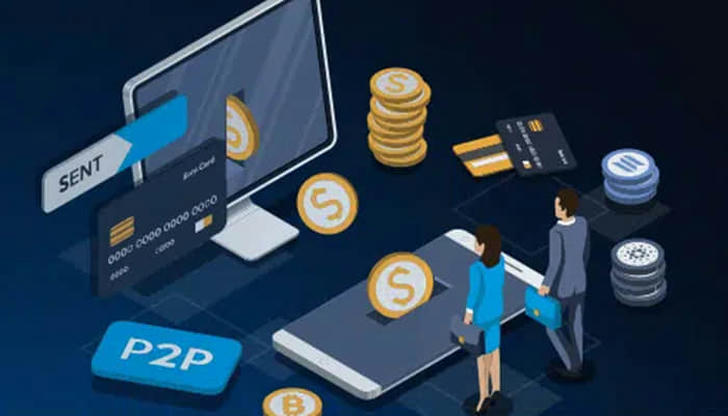How Cryptocurrency Can Be Used to Secure Bad Credit Loans?

In the ever-changing financial landscape, securing a loan can be a daunting task, especially for individuals with bad credit. Traditional lending institutions are often hesitant to offer loans to those with poor credit scores, leaving many people with limited options. However, with the rise of cryptocurrency and decentralized finance (DeFi), a new opportunity has emerged for securing bad credit loans. In this article, we will explore how cryptocurrency can be used as a valuable asset to secure loans, even for those with less-than-perfect credit histories.
How Cryptocurrency Can Help Secure a Loan?

Cryptocurrency provides an innovative way to secure loans without relying on credit scores. Here’s how it works:
1. Collateralized Loans
One of the main ways cryptocurrency can be used to secure a loan is through collateralized lending. In this scenario, borrowers can pledge their digital assets (e.g., Bitcoin or Ethereum) as collateral for a loan. If the borrower defaults on the loan, the lender can seize the collateral to recover the amount owed.
• How It Works:
A borrower offers cryptocurrency as collateral.
The lender provides a loan, typically in fiat currency or stablecoins.
If the borrower fails to repay, the lender liquidates the collateral to cover the loan amount.
• Benefits:
Borrowers can secure loans without a credit check.
Cryptocurrency-backed loans are often faster to process than traditional loans.
Interest rates can be lower compared to payday loans and credit cards.
2. DeFi Lending Platforms

Decentralized Finance (DeFi) has revolutionized lending by removing intermediaries, such as banks. DeFi platforms use smart contracts to facilitate lending and borrowing directly between individuals. These platforms allow users to borrow money against their cryptocurrency holdings, without involving a traditional lender or credit bureau.
• How It Works:
Borrowers deposit cryptocurrency into a DeFi lending protocol.
Smart contracts determine the loan terms, such as interest rates and repayment schedules.
If the borrower defaults, the collateral is liquidated automatically.
• Benefits:
Loans are decentralized and operate outside traditional financial institutions.
More inclusive, allowing people with bad credit to access funds.
No credit checks, as loans are secured by the borrower’s digital assets.
3. P2P Lending Platforms
Peer-to-peer (P2P) lending platforms allow individuals to lend and borrow money directly from each other, bypassing banks and financial institutions. Many P2P platforms now accept cryptocurrency as collateral, offering another alternative for bad credit borrowers.
• How It Works:
Borrowers post their loan requests on a P2P platform, offering cryptocurrency as collateral.
Lenders review the borrower’s terms and decide whether to approve the loan.
If the borrower defaults, the lender claims the collateral.
• Benefits:
Flexible terms tailored to the borrower’s needs.
Faster and often more affordable than traditional loans.
Increased privacy, as many P2P platforms do not require personal information beyond cryptocurrency wallet addresses.
Risks and Challenges of Using Cryptocurrency for Loans

While cryptocurrency offers many benefits for securing loans, it is important to understand the risks involved. Here are a few challenges that borrowers should be aware of:
1. Volatility of Cryptocurrency
The value of cryptocurrencies can fluctuate dramatically, which can create challenges for both borrowers and lenders. If the value of the collateral falls significantly, borrowers may face a margin call, requiring them to add more cryptocurrency to avoid liquidation.
2. Security Risks
Cryptocurrency transactions are irreversible, and loans secured by digital assets can be susceptible to hacks or fraud. Borrowers must take extra precautions to ensure their digital wallets are secure, and they are using trusted platforms.
3. Regulatory Uncertainty
Cryptocurrency is still largely unregulated in many countries, which can create legal and financial uncertainties. While some countries have embraced cryptocurrency, others have imposed strict regulations or outright bans. This can affect the ability of borrowers to access loans in certain regions.
Steps to Secure a Cryptocurrency-Backed Loan

Securing a loan backed by cryptocurrency is relatively straightforward. Here are the steps involved:
Step 1: Choose a Reputable Platform
Start by selecting a trusted cryptocurrency lending platform. Look for platforms with strong security measures, transparent fees, and positive user reviews. Some popular platforms include BlockFi, Nexo, and Celsius.
Step 2: Deposit Cryptocurrency
Once you've chosen a platform, you will need to deposit your cryptocurrency into the platform's wallet. The value of the deposit will determine how much you can borrow.
Step 3: Review Loan Terms
Before agreeing to the loan, make sure to review the terms carefully. Check the interest rate, loan duration, and repayment schedule to ensure it suits your financial situation.
Step 4: Receive Your Loan
After agreeing to the terms, the loan will be processed. Depending on the platform, you may receive the loan in fiat currency or a stablecoin like USDT.
Step 5: Repay the Loan
Make sure to repay the loan on time to avoid penalties or the liquidation of your collateral. Some platforms may allow you to repay the loan in cryptocurrency, while others may require repayment in fiat currency.
Conclusion

Cryptocurrency is proving to be a game-changer for individuals with bad credit who need access to loans. By using digital assets as collateral, borrowers can secure financing without the need for traditional credit checks. While cryptocurrency-backed loans offer several advantages, it is important to carefully consider the risks and choose a reputable platform to ensure a safe and secure borrowing experience. As the world of decentralized finance continues to grow, more opportunities will arise for people to access the funds they need, regardless of their credit history.
By embracing cryptocurrency, borrowers with bad credit can take control of their financial future and open up new possibilities for securing loans in a digital age.
